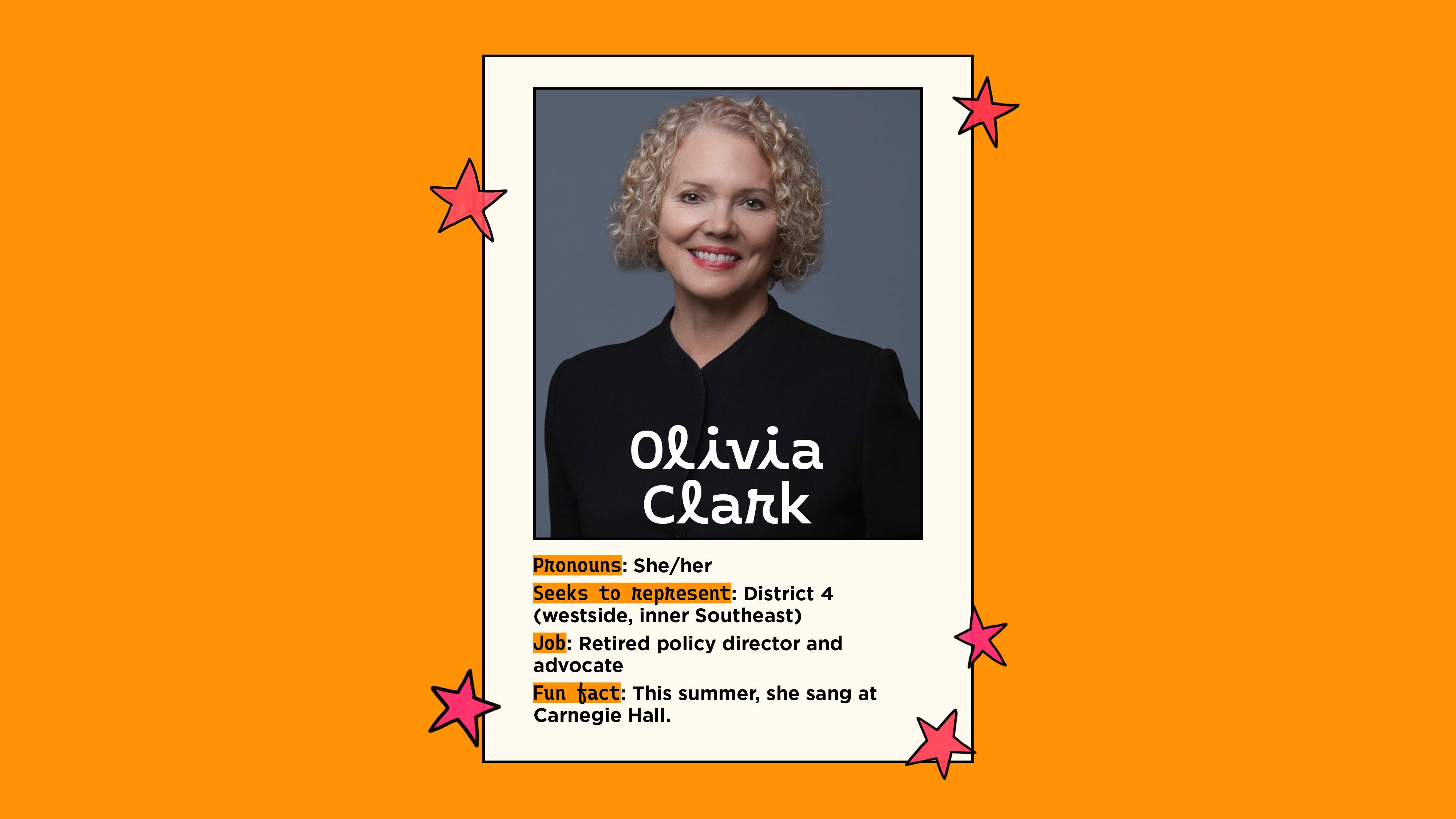Pronouns: She/her
Seeks to represent: District 4 (westside, inner Southeast)
Job: Retired policy director and advocate
Fun fact: This summer, she sang at Carnegie Hall.
Olivia Clark grew up in her father’s diners in California, serving police officers coffee at 5 am and peeling mountains of potatoes after church on Sundays. Clark says she knows hard work, and she’ll use that work ethic—and her years of experience in government—to make the new form of city government work for Portlanders.
“We need people with experience, people who can work across the aisle, who can build coalitions and be collaborative,” she tells WW. “I consider myself one of those people.”
Clark, 70, has lived in Portland for over 25 years. She served as Gov. John Kitzhaber’s liaison for cities and counties for seven years. She then worked for TriMet for over 20 years, first as the executive director of government affairs and then as the executive director of public affairs. During that time, she was also board chair of the Providence hospital system.
This is Clark’s first time running for public office. She has received $80,000 in matching funds through the Small Donor Elections program. Overall, her campaign has raised almost $96,000. She’s been endorsed by Kitzhaber, Multnomah County Commissioner Julia Brim-Edwards, and mayoral candidates Rene Gonzalez and Carmen Rubio. She’s also been endorsed by the police and fire unions, the Northwest Oregon Labor Council and LiUNA Local 737.
We spoke to Clark about her campaign. Questions and answers have been lightly edited for brevity and clarity.
WW: What are your top three priorities if elected?
Olivia Clark: Number one, homelessness and housing. Number two, particularly for me as a woman, public safety. In the long run, I want to make sure that the city is climate resilient, and that our bureaus are ready for climate change.
Beyond policing, what measures would you take to improve public safety in Portland neighborhoods?
We need to have a better response time on 911. I want to know that somebody is going to answer the phone and come and help me. That’s a theme I hear when talking to people in District 4. People also want the police to be more visible as a deterrent. I think we only have maybe 15 people in the traffic enforcement division.
Particularly in the downtown and in Old Town, we need Portland Street Response to be strengthened. We need to give them additional authority to do more than what they do now. They need more structure, training and clinical supervision, as well as the authority to transport people.
How would you support local businesses and foster economic growth in Portland?
We need to change the environment in downtown. We need a navigator to help people who want to start a small business or grow a small business, figure out what tax programs are available to them. We also need to work with the property owners downtown to see if we can’t reactivate some of the empty space.
What aspects of the city’s current approach to drug use and overdose deaths do you support and what would you change?
I would breathe new life into Multnomah County’s Local Public Safety Coordinating Council to ensure that all of our public safety ecosystems are pulling in the same direction. It’s been staff driven to this point, and I’d like to see that change.
We also need that deflection center, and we need sobering centers because the police confront this daily and it’s just a revolving door for them at this point. The social determinants of health and addiction are something that needs to be part of this conversation. The city and the county should convince the state and the federal government that poverty and trauma are the underlying causes of this.
Do you support the city staying in the Joint Office of Homeless Services? What’s your plan to address homelessness?
I’m willing to give it more time. I think the Joint Office needs to show more results and accountability from the nonprofits that they’re funding. I don’t understand why it’s so hard for the JOHS to create a coordinated system of identifying beds. If it can’t do that, then maybe we should reevaluate our participation there.
We’re not acting like this is an emergency. During World War II, we had emergency housing that came up even in my neighborhood. The federal government had us shove aside building codes temporarily so that we could put up housing for all the people who were moving here to either work in the shipyards or who were in the military. We need more housing that is outside the market, housing that is going to remain affordable over time.
Which current City Council members do you and your policies most align with?
I would be the love child of a union between Carmen Rubio and Rene Gonzalez.
How do you want police to respond to the riots in November if Trump wins?
People have a right to express themselves, but they don’t have a right to destroy property, and when well-meaning demonstrations turn into riots, then we need real consequences. We can block off streets. We can provide protection in advance, but if it turns to mayhem, the police must act, and they need to use every legal means to stop the mayhem if that happens.
How do you feel about the new structure of city government and ranked-choice voting?
I feel sorry for the voter. They’re going to get a Voters’ Pamphlet that’s like a phone book, and at least in District 4, they’re going to have over 20 candidates that they’re going to have to study up on if they choose to vote down. If I had a magic wand, I would change this so that we didn’t have multiple candidates per district. Maybe if we have 12 districts with one person coming from them, that might be a little less confusing for people.
See the other Portland City Council Candidates here!
 This article is part of Willamette Week’s Ballot Buddy, our special 2024 election coverage. Read more Ballot Buddy here.
This article is part of Willamette Week’s Ballot Buddy, our special 2024 election coverage. Read more Ballot Buddy here.

